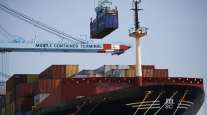Staff Reporter
Intermodal Players Lead on ESG Scores

[Stay on top of transportation news: Get TTNews in your inbox.]
Trucking and logistics companies with a focus on intermodal operations have been leading on environmental, social and corporate governance scoring in the transportation space.
ESG is a corporate governance framework for considering environmental and social issues. It is designed to be included into business strategies to enhance stakeholder value and attract investments. The framework has been popular among larger carriers with much of the focus being on reducing the environmental impact of their operations.
“The intermodal players continue to lead the group in aggregate ESG scores this quarter,” TD Cowen analyst Jason Seidl wrote in a report May 29. “[Schneider National] gained the most places this quarter and is now ranked sixth in the group compared to 12th in 1Q. The U.S. rails were once again towards the bottom of the group as the Ohio derailment continues to produce a considerable degree of negative public scrutiny for the rail industry. The group as a whole has an average ESG score of 59, up 1 point compared to 1Q.”
Covenant Logistics Group was ranked No. 1 in the report with a score of 77 out of 100. Hub Group and Saia both came in the second spot with scores of 71. J.B. Hunt came in next with a score 68. C.H. Robinson Worldwide followed with a score of 66. Schneider came in with a score of 64.

Hub Group has a fleet of 53-foot GPS-equipped containers, according to its website. (Hub Group)
TD Cowen based its scoring on its own data as well as numbers from the analytics firm Truvalue Labs. There are multiple rating providers who base their scores on numerous sources including securities filings, voluntary corporate disclosures, governmental databases, academic studies and media reports.

Meents
“Hub Group’s sustainability strategy focuses on reducing greenhouse gas emissions for our customers and investing in equipment and technology to offset our own emissions, including our electric truck program,” said Brian Meents, executive vice president and chief marketing officer at Hub Group. “We support customers by assessing intermodal conversion from truckload to meet their carbon footprint reduction goals.”
Hub Group has an expansive intermodal operation with over 50,000 containers, 29 trucking terminals and longstanding relationships with the Class I railroads. The company integrates its intermodal operations with other service offerings with the aim of providing its customers with additional cost and emissions savings.
“In 2022, we helped our customers avoid nearly 3.1billion pounds of CO2 emissions and 136mm gallons of fuel by converting TL shipments to the more efficient IML transportation,” Meents said. “Intermodal is about 68% more efficient than over-the-road trucking transportation in the lanes we have converted. We continue to invest by adding newer, more energy-efficient tractors with the latest safety technology reducing the average fleet age annually. We are also investing in electric trucks and the infrastructure to support them.”
Meents also noted that through less-than-truckload consolidation services the company is able to maximize trailer cubage to transport more freight per mile and eliminate unnecessary mileage through network optimization and cross dock management. Hub Group ranks No. 13 on the Transport Topics Top 100 list of the largest for-hire carriers in North America.
C.H. Robinson’s 2022 ESG report is here! Find out how we are delivering sustainable solutions for our customers, supporting our people and local communities, and ensuring our work is grounded in our core values.
Learn more https://t.co/ALAkokwUSK#ESG #Sustainability pic.twitter.com/O8HpwVL1qr — C.H. Robinson (@CHRobinson) June 7, 2023
“When we try to talk about sustainability, we talk about our mission as an organization, which is, we’re here to improve the world’s supply chains by making them more efficient,” said Tim Humbert, vice president of North American intermodal at C.H. Robinson. “By the very nature of our mission and our value, that is going to make it a more sustainable one. We do that through a variety of ways and working collaboratively with our customers about finding the right fit for their supply chain that creates value for them.”
Humbert doesn’t believe sustainability comes down to any one particular transportation mode like intermodal. Instead, it’s about looking at the business needs of customers to connect them with the best modes to move their freight whether that be air, truck, rail or intermodal. He noted those decisions all have implications for the customer and the environment.
“For many years, shippers have looked at transportation and made decisions based on cost and service and speed,” Humbert said. “But now the topic of sustainability is coming into those decisions. And so, we’ve developed a tool for our customer on our platform to allow them to project the impact of those different choices on their emissions.”
Emissions IQ from C.H. Robinson measures carbon output of shippers and shows them where those reductions could possibly be made on a global scale.
“Intermodal is one of the services that Robinson offers our customers to help them meet their needs in their supply chain,” Humbert said. “It’s not the only one. But I think it’s a factor or a component about how we make informed decisions centered on optimizing and creating efficient supply chains for our customers.”
C.H. Robinson Worldwide ranks No. 1 on the TT Top 100 list of the largest logistics companies in North America.
Want more news? Listen to today's daily briefing below or go here for more info:




